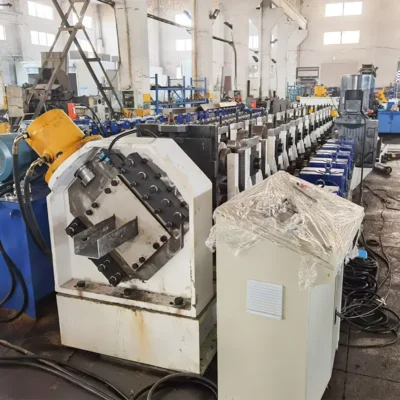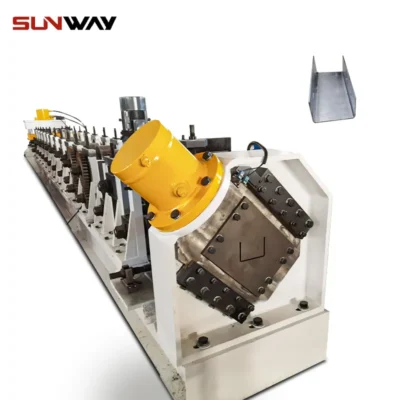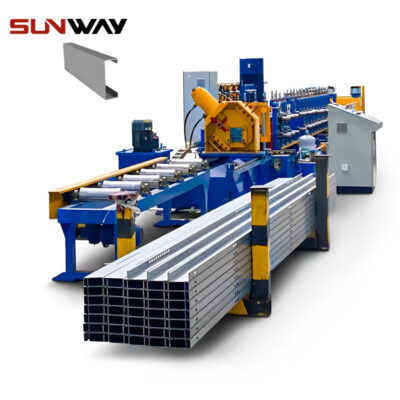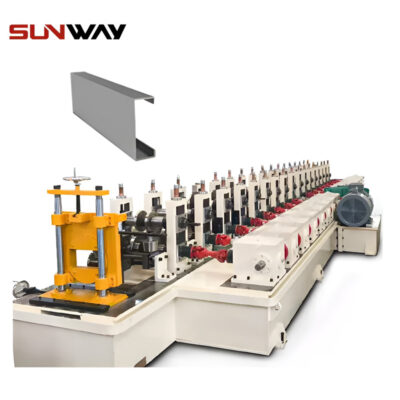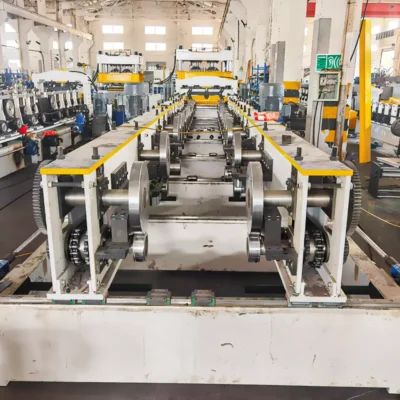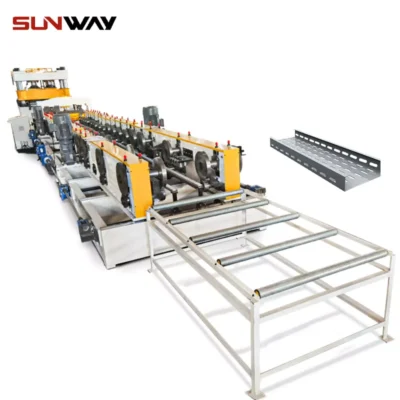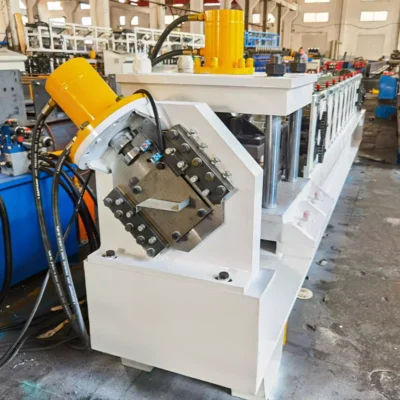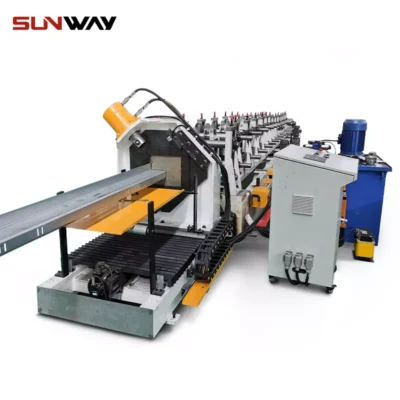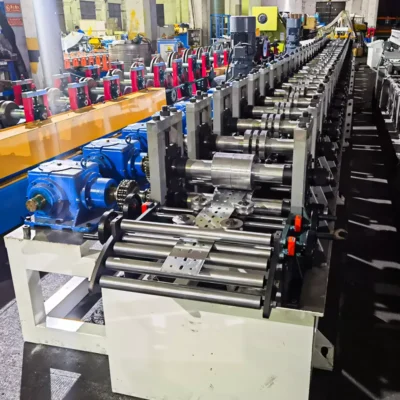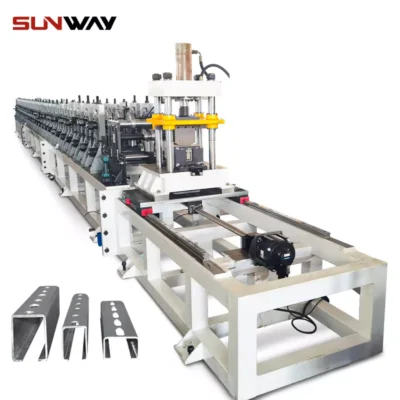The backbone of any industrial operation lies in its components, and machinery parts are no exception. From structural elements to intricate designs, the demand for high-quality, precision-engineered machinery parts is growing at an unprecedented rate. Enter the Machinery Parts Roll Forming Machines, game-changing solution that modernizes the production process, providing manufacturers with the speed, precision, and scalability required to meet market demands.
These machines are the unsung heroes that enable the creation of essential components used in industries such as construction, automotive, energy, manufacturing, and more. In this guide, we’ll explore applications, machine features, workflows, pricing, market trends, and why Wuxi Sunway Machinery is the trusted leader in roll-forming solutions for machinery parts.
What is a Machinery Parts Roll Forming Machine?
ক Machinery Parts Roll Forming Machine is an industrial system designed to produce high-precision metal components used in various types of machinery. These machines take flat metal coils—like galvanized steel, aluminum, or stainless steel—and transform them into parts with specific shapes, dimensions, and tolerances.
Types of Machinery Parts Produced
- Structural Parts: Beams, channels, and brackets for industrial and construction machinery.
- Support Components: Reinforcement plates and frames for heavy-duty equipment.
- Custom Profiles: Tailored designs for niche machines and specialized industries.
- Automotive Parts: Rails, panels, and supports for vehicle assembly.
- HVAC and Electrical Parts: Ducts, enclosures, and other components for mechanical systems.
The ability to automate the production of these parts ensures consistency, cost-efficiency, and scalability—making it an indispensable tool for manufacturers.
Applications of Machinery Parts Roll Forming Machines
The versatility of Machinery Parts Roll Forming Machines allows them to cater to a wide array of industries. Let’s look at where these machines are making an impact:
1. Automotive Industry
- Use Case: Manufacturing structural and support components such as door frames, roof rails, and chassis parts.
- Why It Matters: Enables high-volume production with precision, meeting the stringent quality standards of the automotive sector.
2. Construction Equipment
- Use Case: Producing beams, brackets, and reinforcements for bulldozers, cranes, and other heavy machinery.
- Why It’s Essential: Ensures the durability and reliability of construction equipment under demanding conditions.
3. Renewable Energy
- Use Case: Crafting mounting systems and frames for solar panels and wind turbines.
- Why It’s Relevant: Supports the global shift toward sustainable energy infrastructure.
4. Industrial Manufacturing
- Use Case: Creating parts for assembly lines, packaging machines, and other industrial systems.
- Why It’s Critical: Provides precision-engineered components that ensure the seamless operation of complex machinery.
5. HVAC and Electrical Systems
- Use Case: Producing ducts, enclosures, and brackets for heating, ventilation, and electrical installations.
- Why It’s Useful: Ensures efficient airflow and secure housing for electrical components.
6. Agricultural Machinery
- Use Case: Manufacturing reinforcements, panels, and supports for tractors and harvesters.
- Why It’s Important: Delivers robust components that withstand harsh agricultural environments.
Key Features of Wuxi Sunway Machinery Parts Roll Forming Machines
Wuxi Sunway Machinery is a global leader in roll-forming technology, offering cutting-edge solutions for the production of machinery parts. Here’s why their machines are unrivaled:
1. High Precision and Accuracy
- What It Offers: Dimensional tolerances as low as ±0.1mm.
- Why It’s Critical: Ensures components meet exact specifications, eliminating errors during assembly.
2. Multi-Material Compatibility
- Supported Materials:
- Galvanized Steel
- Aluminum
- Stainless Steel
- Why It Matters: Provides flexibility to produce parts with varying strength, weight, and corrosion resistance.
3. Advanced Tooling Systems
- What It Enables: Quick-change tooling for creating multiple designs on the same machine.
- Why It’s Beneficial: Reduces downtime and increases production efficiency.
4. Integrated Punching and Cutting
- What It Offers: Built-in systems for punching holes, slots, and custom designs while cutting parts to length.
- Why It’s Essential:
- Minimizes secondary operations.
- Ensures alignment and precision for complex parts.
5. IoT and Automation Integration
- What It Enables: Real-time monitoring, automated adjustments, and predictive maintenance using IoT technology.
- Why It’s Game-Changing:
- Enhances production efficiency.
- Reduces material waste.
- Improves machine uptime through proactive issue resolution.
6. Modular Design
- What It Provides: Machines with modular configurations that can be expanded or upgraded as production needs grow.
- Why It’s Future-Proof: Accommodates evolving business requirements, ensuring long-term ROI.
7. High-Speed Production
- Performance: Capable of producing up to 20–50 meters of profiles per minute, depending on material and complexity.
- Why It’s Beneficial: Meets the high-volume demands of industries like automotive and construction.
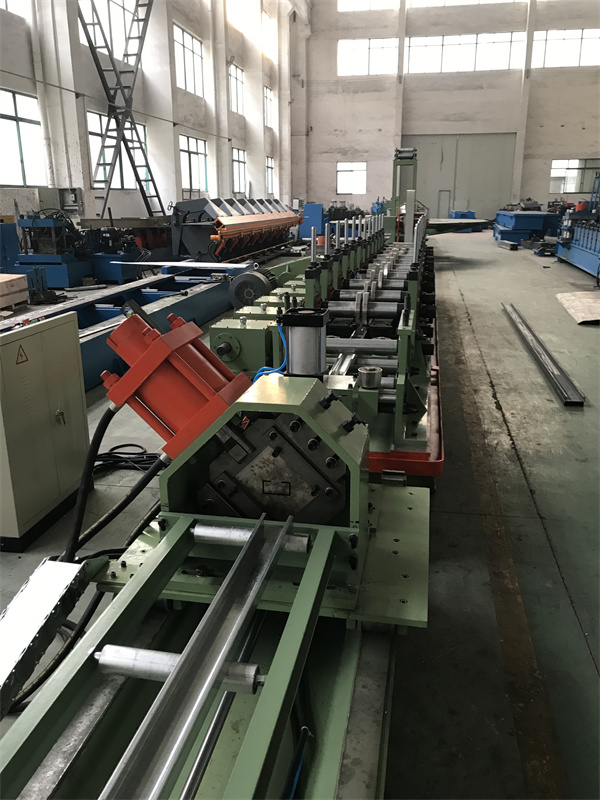
Production Workflow of a Machinery Parts Roll Forming Machine
The production process for machinery parts is engineered to maximize efficiency and precision. Below is a typical workflow:
1. Material Loading
- Metal coils are placed on the machine’s decoiler, which feeds the material into the system.
2. Straightening and Leveling
- A leveling system ensures the material is flat and defect-free before entering the roll-forming section.
3. Roll Forming
- The material passes through a series of precisely aligned rollers, gradually forming it into the desired profile.
4. Punching and Cutting
- Integrated punching systems create holes, slots, or custom perforations as needed.
- Hydraulic or high-precision cutters trim the parts to the required lengths.
5. Quality Inspection
- Finished parts are inspected for dimensional accuracy, surface finish, and compliance with industry standards.
6. Stacking and Packaging
- Completed parts are stacked, bundled, and prepared for transportation to manufacturing or assembly sites.
Pricing of Machinery Parts Roll Forming Machines
The cost of a Machinery Parts Roll Forming Machine depends on its features, production capacity, and customization options. Below is a general pricing guide for 2025:
| Machine Type | Capabilities | Price Range (USD) |
|---|---|---|
| Standard Machines | Basic production of common profiles | $150,000–$300,000 |
| Advanced Machines | High-speed and multi-profile output | $300,000–$600,000 |
| কাস্টমাইজযোগ্য মেশিনসমূহ | Including punching, IoT, and automation | $600,000–$1,000,000 |
For detailed pricing and financing options, contact Wuxi Sunway Machinery.
Market Trends for Machinery Parts Roll Forming Machines in 2025
The machinery parts industry is evolving rapidly, driven by advancements in technology, sustainability, and global infrastructure projects. Here are the trends shaping the adoption of Machinery Parts Roll Forming Machines:
1. Growing Demand for Automation
- The Trend: Industries are increasingly automating their production lines to improve efficiency.
- How Machines Help:
- Enable high-speed, automated production of precision-engineered parts.
- Reduce labor costs and production downtime.
2. Sustainability Focus
- The Push: Manufacturers are prioritizing eco-friendly practices.
- How Machines Help:
- Minimize material waste through precision engineering.
- Process recyclable metals to reduce environmental impact.
3. Expansion of Renewable Energy
- The Opportunity: Rising investments in solar, wind, and geothermal projects.
- Machine Contribution:
- Produce mounting systems and frames for renewable energy installations.
- Support scalable solutions for growing infrastructure needs.
FAQs About Machinery Parts Roll Forming Machines
| Question | Answer |
|---|---|
| What materials can these machines process? | Galvanized steel, stainless steel, aluminum, and pre-coated metals are commonly used. |
| What is the average production speed? | Machines can produce up to 20–50 meters of profiles per minute, depending on material and complexity. |
| Can these machines handle custom designs? | Yes, Wuxi Sunway machines are equipped with customizable tooling for bespoke profiles. |
| What industries benefit most from these machines? | Automotive, construction, renewable energy, HVAC, and industrial manufacturing. |
| Do these machines comply with global standards? | Yes, they meet ISO, ASTM, EN, and other international safety and quality standards. |
| Are these machines energy-efficient? | Absolutely! Wuxi Sunway machines feature energy-saving motors and optimized workflows. |
| What is the lifespan of these machines? | With proper maintenance, these machines last 15–25 years or more. |
| Is training provided with the purchase? | Yes, Wuxi Sunway offers comprehensive training and after-sales support for all customers. |
Real-World Use Cases of Machinery Parts Roll Forming Machines
To truly understand the transformative impact of Machinery Parts Roll Forming Machines, let’s examine real-world scenarios where these machines are delivering unmatched results.
1. Automotive Chassis Manufacturing
- Scenario: A leading automotive manufacturer needed a cost-effective way to produce precision chassis components for its new SUV line.
- Machine Contribution:
- Produced high-strength steel chassis parts with exact tolerances to ensure safety and reliability.
- Enabled high-speed production to meet the tight deadlines of the automotive supply chain.
- Integrated punching and cutting systems eliminated secondary operations, reducing overall costs.
2. Construction Machinery Manufacturing
- Scenario: A construction equipment company required durable brackets and beams for its line of bulldozers and cranes.
- Machine Contribution:
- Crafted heavy-duty parts capable of withstanding the extreme stresses of construction environments.
- Processed corrosion-resistant materials to ensure longevity in outdoor conditions.
- Delivered flexibility with custom tooling to produce multiple part designs on the same machine.
3. Solar Panel Mounting Systems
- Scenario: A renewable energy company was building solar farms and needed mounting systems for thousands of solar panels.
- Machine Contribution:
- Manufactured lightweight yet durable aluminum frames for solar panel installation.
- Provided modular designs to accommodate scaling the project across multiple sites.
- Supported eco-friendly practices by processing recyclable materials with minimal waste.
4. Heavy Industrial Equipment
- Scenario: A manufacturing plant producing industrial equipment needed a reliable source of reinforcement plates and frames.
- Machine Contribution:
- Produced reinforcement components with precision-engineered dimensions for seamless assembly.
- Ensured components met international safety standards for heavy industrial usage.
- Delivered high-volume production to maintain uninterrupted supply for the assembly line.
5. HVAC Ducts and Electrical Enclosures
- Scenario: A large-scale commercial HVAC project required ducts and enclosures for its ventilation and electrical systems.
- Machine Contribution:
- Created ducts and enclosures with smooth surfaces to optimize airflow and reduce noise.
- Integrated perforation systems for easy installation of electrical components.
- Enabled rapid production to meet the tight deadlines of the construction project.
Sustainability Benefits of Machinery Parts Roll Forming Machines
Sustainability is no longer just a corporate responsibility; it’s a competitive advantage. Modern manufacturers are adopting eco-friendly practices, and Machinery Parts Roll Forming Machines play a pivotal role in reducing the environmental impact of production.
1. Reduced Material Waste
- The Advantage: Advanced roll-forming technology ensures precise material usage, minimizing scrap and waste.
- Environmental Impact:
- Reduces raw material consumption by up to 20–30% compared to traditional manufacturing methods.
- Lowers costs associated with waste disposal and recycling.
2. Energy Efficiency
- The Feature: Energy-efficient motors and optimized production workflows minimize power consumption.
- Why It’s Important:
- Reduces electricity usage by up to 15–25%, lowering operational costs.
- Supports sustainability goals by decreasing the carbon footprint of manufacturing operations.
3. Use of Recyclable Materials
- What It Enables: Machines process recyclable metals such as aluminum, stainless steel, and galvanized steel.
- Why It Matters:
- Encourages the reuse of materials, contributing to a circular economy.
- Reduces dependency on non-renewable resources.
4. Durability of Components
- The Result: Parts produced by roll-forming machines are highly durable and corrosion-resistant.
- Why It’s Sustainable:
- Extends the lifespan of machinery, reducing the need for frequent replacements.
- Minimizes waste generated by discarded or worn-out components.
5. Modular and Scalable Designs
- The Contribution: Machines enable the production of modular parts that can be easily upgraded or reused.
- Why It’s Beneficial:
- Reduces waste during equipment upgrades or reconfigurations.
- Promotes sustainable practices across various industries.
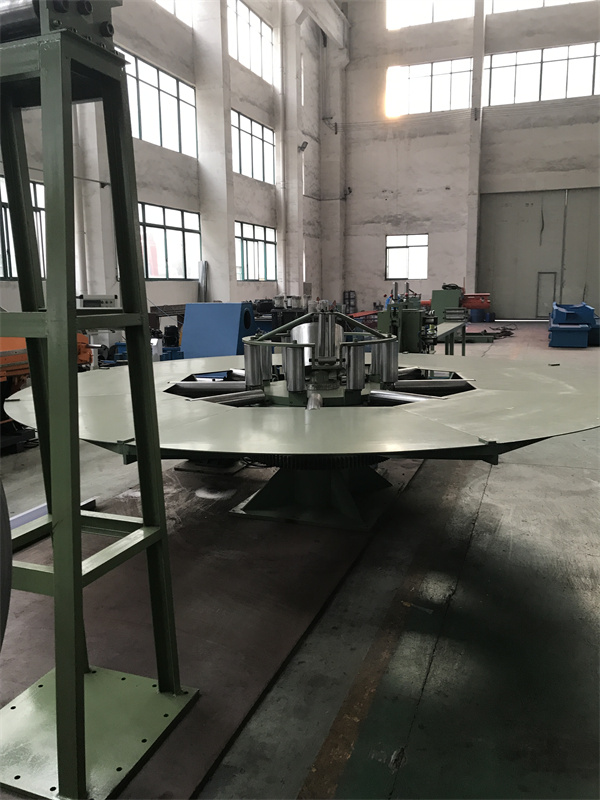
Global Compliance Standards for Machinery Parts Manufacturing
To ensure safety, reliability, and international market access, machinery parts must comply with rigorous global standards. Wuxi Sunway Machinery’s Roll Forming Machines are engineered to produce parts that meet these requirements.
| Standard | Region | Requirement |
|---|---|---|
| ISO 9001 | Global | Ensures quality management principles in manufacturing processes. |
| ISO 14001 | Global | Focuses on environmental management systems to reduce environmental impact. |
| ANSI B11.20 | USA | Specifies safety requirements for roll-forming systems. |
| EN 1090 | Europe | Governs the production of structural steel and aluminum components. |
| CE Marking | Europe | Certifies compliance with EU safety, health, and environmental regulations. |
| JIS B6901 | Japan | Covers safety standards for roll-forming machinery in industrial applications. |
By adhering to these standards, Wuxi Sunway Machinery ensures that its machines and the parts they produce are safe, reliable, and compliant with global regulations.
FAQs About Machinery Parts Roll Forming Machines
| Question | Answer |
|---|---|
| What materials can these machines process? | Galvanized steel, stainless steel, aluminum, and pre-coated metals are commonly used. |
| What industries benefit most from these machines? | Automotive, construction, renewable energy, HVAC, and industrial manufacturing. |
| Are these machines customizable? | Yes, Wuxi Sunway machines come with customizable tooling to produce bespoke profiles and designs. |
| How energy-efficient are these machines? | Wuxi Sunway machines feature energy-saving motors and workflows, reducing power consumption by up to 25%. |
| Do these machines comply with global standards? | Absolutely! They meet ISO, ANSI, EN, and other international safety and quality standards. |
| What is the typical lifespan of these machines? | With proper maintenance, these machines last 15–25 years or more. |
| Is training provided with the purchase? | Yes, Wuxi Sunway offers comprehensive training and after-sales support for all customers. |
| Can these machines handle high-volume production? | Yes, they are designed to produce up to 50 meters of profiles per minute, depending on the material and complexity. |
Why Wuxi Sunway Machinery is the Industry Leader
Wuxi Sunway Machinery has earned its reputation as a global leader in roll-forming technology, offering tailored solutions for manufacturers across diverse industries. Here’s why they’re the go-to choice for machinery parts production:
- Proven Expertise: Decades of experience in delivering innovative roll-forming solutions tailored to customer needs.
- Global Reach: Trusted by clients in Asia, Europe, the Americas, and beyond.
- Cutting-Edge Technology: Features like IoT integration, high-speed production, and customizable tooling set Wuxi Sunway apart.
- Sustainability Commitment: Machines are designed to align with eco-friendly manufacturing practices, reducing waste and energy consumption.
- Reliable Support: Comprehensive training, installation, and after-sales services ensure smooth operations.
Conclusion: Precision Manufacturing for a Sustainable Future
দ্য Machinery Parts Roll Forming Machine is more than just a manufacturing tool—it’s a catalyst for innovation and efficiency in global industries. By enabling the production of high-quality, precision-engineered components, these machines are helping businesses build the infrastructure, vehicles, and equipment of tomorrow.
Looking to elevate your production capabilities? Partner with Wuxi Sunway Machinery today and explore their state-of-the-art roll-forming solutions. Together, let’s shape the future of manufacturing—one part at a time!

